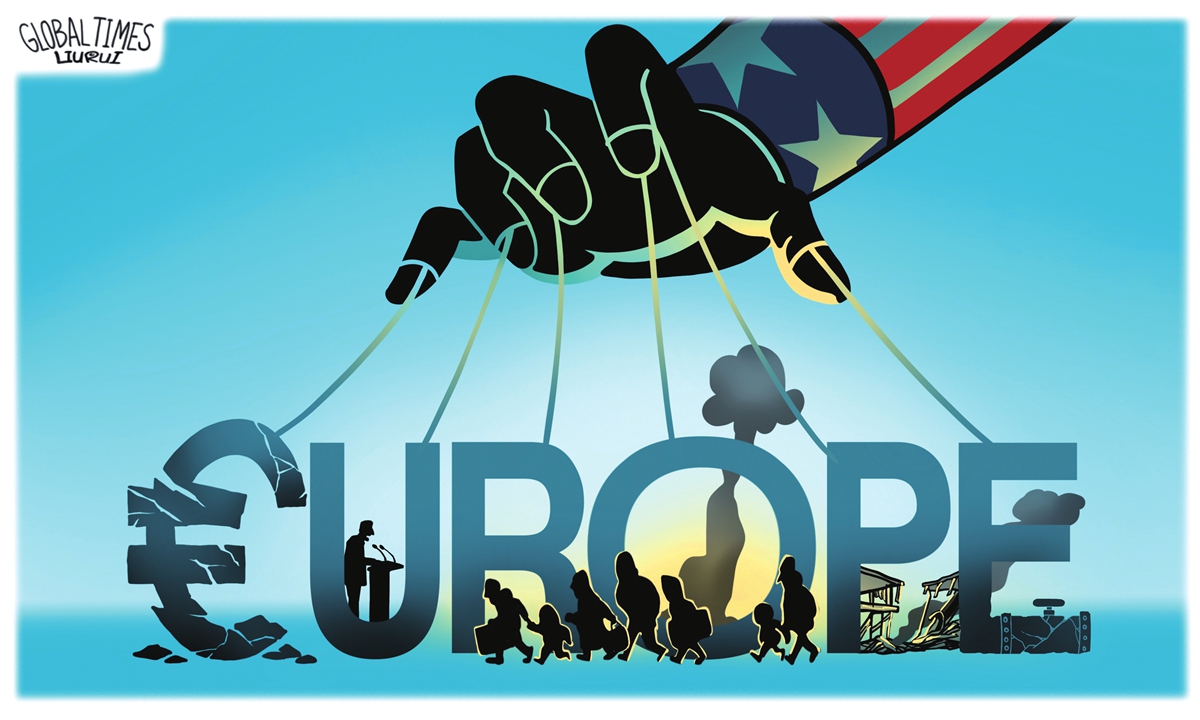
US' game of manipulation Illustration: Liu Rui/GT
Over 50 days have passed since the outbreak of the Russia-Ukraine conflict. The temperature of the tensions is on the rise. Reports show the EU is about to step up their sanctions against Russia. And Ukrainian President Volodymyr Zelensky said Ukraine can fight Russia for "10 years." He might want to convey the message that Ukraine can hold on. Yet there is one big question: Will Europe keep it company?In an interview with CNN aired on Sunday, Zelensky made the "10 years" statement, asking Western countries for more equipment, saying "it needs to be delivered very quickly."
It is exactly due to the continuous flow of economic and military aid from the US and NATO that has prolonged the military conflict, cheering Ukraine up to fight a 10-year war. But it is in the end an illusion. How long will the conflict last; how many missiles can Ukraine make use of; and how much ability does the country have to keep fighting Russia - depending on how many more weapons the US and NATO are willing to supply to Ukraine, Shen Yi, a professor at Fudan University, told Global Times. "But those countries never pledged the assistance is for free. In the long run, how would Ukraine pay them back?" Shen asked.
More importantly, is Europe prepared to see a 10-year war on its own continent? Imagine what would happen to Europe: It would turn into a bleeding decade.
By then, Europe, being entangled in a war, will completely lose its security autonomy and become fully reliant on the US umbrella. It will have to confront a 10-year crisis on energy, food, refugees and inflation. Social turmoil will surface. The bloc may even split on the issue.
On Sunday, Reuters quoted European Commission President Ursula von der Leyen as saying that the EU's forthcoming sanctions on Russia, also the sixth round of sanctions, will target banks, in particular SberBank, one of the largest financial institutions in Russia, as well as Russian oil.
Europe already lacks oil and gas. If it implements the plan, Europe will hurt itself more, and European countries will be further divided, Sun Keqin, a research fellow at the China Institutes of Contemporary International Relations, told the Global Times.
At the same time, this is exactly what the US has been wishing for.
Apart from making a fortune through arms sales, Washington has already taken advantage of the war to take Europe under control, unite NATO, land a blow on Russia and will possibly pool more strength to contain China in the future, according to Sun.
To reach its goal, the US is ready to fight not only to the last drop of Ukrainian blood, but also "the last drop of European blood," George Galloway, a six-term British parliamentarian, told Global Times in a previous interview.
In the short run, perhaps everything goes well according to the US playbook. But in the long run, where will the US, the No.1 economic and military superpower on Earth, lead this world amid various crises? "The answer seems to be a new cold war, or a globe filled with conflicts everywhere," Sun said. The problem is, Sun added, after spoiling this world like that, will the US be immune to the mess?
The US may be harvesting small profits, but is losing big ones. Fortunately, Europe still maintains some sober consciousness. "Europe Reluctantly Readies Russian Oil Embargo," The New York Times reported on Thursday, pointing out that "Officials are drafting a phased import ban on Russian oil products, but the measure won't be floated until after the second round of the French elections at the earliest."
Just like Germany's reactions to the EU's plan to ban Russian coal, which was announced earlier this month. Berlin said it would need a full 120-day period to implement the ban. This is a delaying tactic.
Europe does not want to see the war too long, let alone 10 years. "When the crisis starts to move toward a pragmatic solution, Europe will not be absent," Shen said. After all, it is about Europe's own interests.
